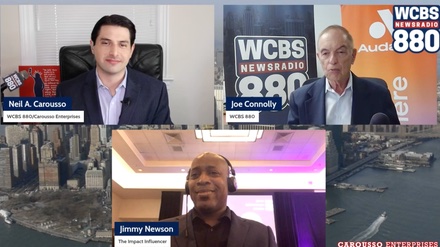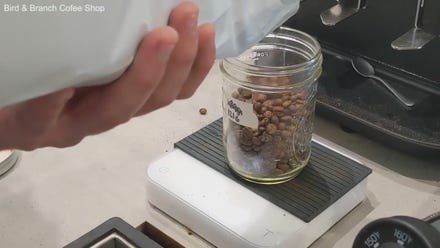
The Latest

Neil A. Carousso Joins Growing NewsNation Network

Neil A. Carousso Departing WCBS 880

Art Business Founded by Former Foster Child Speaks to the Human Experience

1010 WINS Small Business $10K Challenge: Small Business Owners Make their Pitch for $10,000

NYC’s Élan Flowers Evolves into Blooming Subscription and Corporate Services

Creating an Authentic Retail Experience Online

WCBS Business Breakfast: Growth in the Hybrid Workplace

Creating a Small Business Growth Strategy

Long Island City’s Growing Business District

SuperQuickQuestion Creates Short and Sweet Interactions with Pro Athletes and their Fans
-
Small Business Spotlight: Social Missions Brew Business for Midtown Coffee Shop
Post Views: 544By Joe Connolly and Neil A. Carousso
NEW YORK (WCBS 880) — Bird & Branch Coffee Shop on 45th Street and 9th Avenue in Midtown Manhattan is brewing opportunity for those struggling to find work.
“It’s just in our face all the time like the great need that New Yorkers have and I just felt like what I did either helping out at a soup kitchen or giving money were just very small Band-Aids to a huge problem,” said owner Faith Lee on the WCBS Small Business Spotlight with Joe Connolly and Neil A. Carousso, sponsored by Dime Community Bank.
Faith and her husband Brandon opened the store four and a half years ago not for a love of coffee but out of a mission to help New Yorkers overcome barriers to employment. They train mostly younger workers on soft skills that are transferrable to careers in retail and hospitality. Currently, six people work at Bird & Branch – down from 13 pre-pandemic.
“We allow them to sort of go through that process without the pressure of having to perform at the level we ultimately want them to perform at, but allows them to sort of grow into that space and I think people need that time,” she explained.
Bird & Branch Coffee Shop was awarded a $10,000 grant through Newell Brands’ “Made For More” Small Business Fund for their commitment in helping to restore the city through their skills training program. The makers of Ball® home canning products selected 10 small businesses for the grant out of about 2,000 applicants in recognition of those who have gone above and beyond in their local communities. The winners receive the grant, public relations support and exposure on the Ball home canning brand’s social media.
Faith was an opera singer for 10 years and Brandon worked in event marketing before they got into the coffee business with the help of friends and family who wanted to invest in their social mission.
“We were talking about it a lot to just our friends, random people we met, and every one of our investors actually approached us about investing,” Lee said. “We never pitched anyone.”
Sometimes the most effective sales strategy is not outwardly selling but letting one’s passion for his or her business shine through.
Bird & Branch is seeing a gradual increase in foot traffic now that some people have returned to work in Midtown offices more than a year after the pandemic ravaged the Big Apple. Their customer base changed in the pandemic from mostly commuters to Manhattanites living nearby.
During the height of the pandemic, they collected donations for breakfast meals they prepared for hospital workers. Lee told Connolly and Carousso that a number of her customers started inquiring about similar care packages to send their loved ones.
“We just started shipping out these care packages, which include baked goods that we make in-house as well just some other fun things,” she said. “People have been down or they haven’t seen each other in so long they just wanted to send their friends something and that has really enabled us to stay alive as well.”
Bird & Branch’s business pivot led to a full-time, profitable service.
See how to grow a business with a social mission on the WCBS Small Business Spotlight video above.
-
Small Business Spotlight: Gyms Feel Weight of the Pandemic 13 Months Later
Post Views: 712By Joe Connolly and Neil A. Carousso
NEW YORK (WCBS 880) — While people start to think about getting in shape for the summer, fitness gyms are struggling to stay open.
Indoor fitness classes in New York City are allowed at 33 percent capacity. Outside of the city, gyms may increase their capacities from 33 percent to 50 percent on May 15. Many gym owners say it’s not enough to sustain as the COVID-19 pandemic nears its 14th month.
“Right now, we offer in-person classes but also online classes as well and some people do both,” said Katie Muehlenkamp, Brooklyn franchisee of The Bar Method with locations in Cobble Hill and Williamsburg.
On the WCBS Small Business Spotlight, sponsored by Dime Community Bank, Muehlenkamp told Joe Connolly and Neil A. Carousso that online classes have only supplemented her revenue.
“I generally find that people either prefer one or the other,” she said. “People who come back in-person generally just do the in-person, because they feel and see the value of being in-person much more.”
Muehlenkamp, a former competitive gymnast and instructor at the company’s flagship studio in San Francisco, said online classes can only work for a “small subset of people” because The Bar Method requires more space than a Brooklyn studio apartment. It consists of isometric exercise; small motions work targeted muscles to build strength.
She also said in-person classes offer a sense of camaraderie and accountability for one’s fitness goals that her clients are “craving.”
“We’re human beings. We have a fundamental desire to be around other people and fitness is just one aspect of it,” Muehlenkamp said.
But right now, The Bar Method hosts less than 40 classes a week with 10 people max. Pre-pandemic, they ran 80 in-person classes with up to 30 people in each class. They are now offering meditation classes at the Williamsburg location as clients seek mental health services to cope with the pandemic.
“I think there’s a huge generational group that’s looking for those outlets,” she said, noting other gym owners are launching adjacent health and wellness services.
Muehlenkamp is advocating for the GYMS Act of 2021, which would authorize the U.S. Small Business Administration to make initial and supplemental grants to privately owned fitness gyms that have struggled in the pandemic.
She received two Paycheck Protection Program (PPP) loans to pay employees and the SBA provided relief on business loans she obtained to open her franchises. But, the biggest sense of relief came when her landlords agreed to reduce her rents.
“I think they get it. I mean these are smart people,” Muehlenkamp said, acknowledging her landlords have their own financial obligations.
She said she approaches her negotiations with full disclosure and candor.
“It’s kind of like, ‘Okay, well if you don’t lower it to about the amount that I’m talking about, this business isn’t viable. Here’s my financial statements. I’m not hiding anything. This is the situation,'” Muehlenkamp explained.
While she feels uncertain about the fitness industry’s future, Muehlenkamp told Connolly and Carousso she is encouraged by new small businesses that are catering to current market needs.
Watch the Small Business Spotlight video above for more advice for fitness gyms and other hard-hit industries.
-
‘Influence starts with listening’: High-powered business coach on inspiring results
Post Views: 537By Joe Connolly and Neil A. Carousso
NEW YORK (WCBS 880) — The most successful business leaders inspire and motivate their employees to do their best work.
“The number one reason people will do things for you is because they like you,” said Alisa Cohn – a former startup CFO who blossomed into a startup and CEO coach, advising the leaders of major corporations such as Pfizer, Microsoft, Google and IBM.
Cohn writes, “Influence is the way you get others on board and sell your ideas.” On the WCBS Small Business Spotlight, sponsored by Dime Community Bank, she elaborated by telling Joe Connolly and Neil A. Carousso that “influence starts with listening” to employees’ perspectives and aspirations.
“When you listen to people and hear back what they say, that is the way people begin to start liking you, appreciating you, and that relatedness is going to help you sell ideas even if they’re a little bit controversial to the person that you’re talking to,” she explained.
This effort to understand diverse views will put workers in the best position to succeed and achieve corporate goals.
“You can’t just tell people what to do even if you’re the boss,” Cohn said, adding, “They don’t do what you want them to do just because you want them to do it, and if they did, they’re not really the best workers because you want people who are innovative, and creative, and resourceful. You don’t just want compliant order takers.”
The highly regarded business coach and guest lecturer at Harvard University and Cornell University allows it’s hard work to cultivate a team of entrepreneurial-minded employees, but that will foster sustainable growth.
“If you invented and are now building a startup around a new way of doing COVID testing that’s quick and easy, that’s fantastic but that may not be the market need over time,” Cohn said of sustainability in an unprecedented business climate. “You got to expand that to think overall about doing testing of other kinds of things so that people can get the information they need, because they don’t necessarily need to know forever if they have COVID, but they do need to understand important health information about themselves over time.”
Cohn told Connolly and Carousso the best way to grow a brand is to build a strong reputation and find opportunities to disseminate your ideas with potential customers and the business community.
“It’s very helpful to share your ideas on a blog, get published, and over time get published on more and more prestigious and high-end publications so your ideas have merit,” she said.
Links to publications where you and your business were quoted or featured on your website are effective marketing tools along with client testimonials. Cohn calls this “social proof” whereby those with whom you’ve done quality business are implicitly or explicitly endorsing your services.
Learn how to grow a sustainable business and empower your workers to deliver results on the Small Business Spotlight video above.
-
Small Business Spotlight: Pandemic Uncertainty Fuels Suburban Housing Shortage
Post Views: 565By Joe Connolly and Neil A. Carousso
WCBS 880 (NEW YORK) — The housing market has flipped upside down.
As people grow accustomed to new living habits, their housing needs have changed.
Alison Bernstein, founder of The Suburban Jungle Group, owns proprietary software that helps families develop a “home search strategy,” focusing on the neighborhood rather than the housing transaction.
“I think this whole pandemic and the way that we live and the way that we look at life has really shown that thinking about, objectively, all of your options is transforming the way you purchase real estate,” Bernstein said on the WCBS Small Business Spotlight, sponsored by Dime Community Bank.
She started the company in 2004 shortly after having her first child when she was considering moving out of the city to New York’s suburbs to raise her family.
In her home search, she realized there are three bedroom homes everywhere, but only one neighborhood that best suits each family.
“You want to understand, specifically, the community before you get into the home purchase,” said Bernstein.
Her employees are trained to be objective advisors to find the right community fit for each family depending on their lifestyle. For example, The Suburban Jungle Group would recommend a town on Long Island with Little League teams for a family with a young boy who’s interested in baseball. They partner with local agents to make the home purchase.
People are resetting their priorities and Bernstein believes they’re catching onto the flexibility of remote work, which has enabled The Suburban Jungle Group to grow, attract and retain talent, and expand nationally. They recently opened offices in Denver, Philadelphia and South Florida.
“The other piece of it is never having a written out business plan because I always explain to people that your business changes every day and I think where some of these businesses really got stuck when the world changed so quickly (is) they kept going back to this plan,” she said, adding, “You have to be quick and nimble.”
Bernstein told WCBS 880’s Joe Connolly and Neil A. Carousso the housing market is in a bit of a “holding pattern” right now because people are unsure if they will return to the office five days a week, work on a hybrid schedule or stay fully remote as the COVID-19 pandemic extends past a year.
“Right now, all across the board, specifically in the New York market, we’re facing an inventory issue outside of the city and a lot of that has really been driven by sort of the weirdness of the dynamic,” she explained. “This back to work is a big question. There are so many thoughts on what that’s going to look like and nobody really knows and that’s going to be a key determinant in terms of what’s happening in the market.”
The real estate veteran said there’s a lack of housing inventory in the suburbs nationwide, noting people used to live close to where they work, but commuting distance may be outdated for some workers in the post-pandemic economy.
“The home has been completely redefined,” Bernstein said. “Not only is it a place where you sleep, but now, you’re working, you’re schooling, you’re shopping, you’re eating, you’re exercising, so everything about the home is different. And so, now people’s take on home and where they want to be is also very different.”
See the new trends in the real estate market as people’s living habits and needs have changed on the WCBS Small Business Spotlight video above.
-
Small Business Spotlight: Brooklyn Entrepreneur Scales Property Maintenance Business to New Heights
Post Views: 688By Joe Connolly and Neil A. Carousso
NEW YORK (WCBS 880) — This entrepreneur is coming into his own.
Anthony Finkel grew up in Ditmas Park, Brooklyn where he developed an appointment-based snow removal service in 2013. He cleaned up, literally.
“That first snowfall, I got a bunch of phone calls. They called us again that next time, and when that first winter was up, they started asking us, ‘Hey, can you paint my porch, can you clean out my garage, can you fix my deck?'” he told Joe Connolly and Neil A. Carousso on the WCBS Small Business Spotlight, sponsored by Dime Community Bank.
Finkel met their needs and expanded his offerings at DPH Property Maintenance Service. When the pandemic hit, demand surged.
U.S. home improvement projects and repairs grew more than 3 percent last year to nearly $420 billion, according to a report from Harvard University’s Joint Center for Housing Studies.
Finkel reaped the benefits, telling WCBS 880 demand has remained high over the past year and it’s picking up this spring.
“They’re home, they’re not going to the office as much, and now, they’re converting that extra room that might have had clutter in it,” he explained. “Now, they want to clean it out, they want to re-paint it and they want to turn it into their home office or their studio space.”
People are investing in their homes and personal space while many companies look to implement hybrid work schedules when they can bring workers back to the office with COVID-19 safety measures in place. Some employees may never return to the office.
Finkel is renovating corporate spaces, too. He says it’s a “mixed bag” among his clients who plan to work from home long-term and those who will go back to their office.
He had six employees pre-pandemic and has hired four more to keep up with rising demand. He hopes to double the number of workers in the next 12 months if he can double subscriptions to his home and garbage clean-up service from 50 city dwellers to 100.
“When you understand the scope of the work that you’re doing and the quality, and you’re able to bring high quality, it makes it a little bit easier to stand by your pricing and stand by your ask because you know what you’re going to bring to the table, Finkel said. “When people hire DPH, they’re getting dependability, reliability, high quality service and no-nonsense.”
He told Connolly and Carousso customer service and quality has been the key for DPH Property Maintenance Service’s growth not volume, emphasizing research as the foundation of his home improvement work.
“It’s not about how fast, but it’s how precise,” Finkel explained. “You don’t want to have to go back and re-fix things that you thought were done before.”
See how this small business is scaling quickly and meeting demand on the WCBS Small Business Spotlight video above.
Social Feeds

VIDEO: Told the airline to book us on the next flight out (SPONTANEOUS TRIP!)

VIDEO: The Taylor Swift Effect | WCBS Business Breakfast

VIDEO: Future of NYC | WCBS Business Breakfast

VIDEO: Reasons for New Yorkers to be Optimistic | WCBS Business Breakfast

VIDEO: NYC's AI Chatbot | WCBS Business Breakfast






